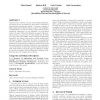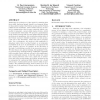2024 search results - page 369 / 405 » The cost of social agents |
ATAL
2009
Springer
15 years 5 months ago
2009
Springer
A combinatorial auction mechanism consists of an allocation rule that defines the allocation of goods for each agent, and a payment rule that defines the payment of each winner....
ATAL
2009
Springer
15 years 5 months ago
2009
Springer
Game-theoretic solution concepts, such as Nash equilibrium, are playing an ever increasing role in the study of systems of autonomous computational agents. A common criticism of N...
SIGECOM
2009
ACM
15 years 5 months ago
2009
ACM
Restricting the preferences of the agents by assuming that their utility functions linearly depend on a payment allows for the positive results of the Vickrey auction and the Vick...
80
Voted
ATAL
2007
Springer
15 years 5 months ago
2007
Springer
We derive optimal bidding strategies for a global bidding agent that participates in multiple, simultaneous second-price auctions with perfect substitutes. We first consider a mo...
HRI
2006
ACM
15 years 5 months ago
2006
ACM
We present a method of grounded word learning that is powerful enough to learn the meanings of first and second person pronouns. The model uses the understood words in an utteran...


